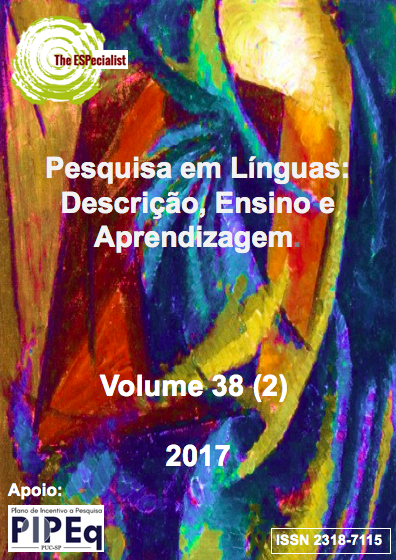O PAPEL DOS MARCADORES DISCURSIVOS NA ESCRITA E NA FALA: UMA TAXONOMIA TEXTUAL E INTERPESSOAL SOB O ENFOQUE DA LINGUÍSTICA SISTÊMICO-FUNCIONAL
DOI:
https://doi.org/10.23925/2318-7115.2017v38i2a4Palabras clave:
Marcadores discursivos, Artigo de opinião, Conversa, Linguística Sistêmico-FuncionalResumen
Desconhecer que as escolhas lexicogramaticais da escrita diferem daquelas do oral, faz com que o falante realize uma transferência de características da oralidade para escrita, como o uso de marcadores discursivos. Este artigo examina a ocorrência dos marcadores discursivos textual e interpessoal e sua função na persuasão do texto. O corpus compõe-se de uma entrevista (Projeto NURC) e de um artigo de opinião (Folha de S. Paulo). A Pesquisa tem apoio da Linguística Sistêmico-Funcional, desta forma a entrevista e o artigo de opinião foram segmentados em unidades oracionais, cujas relações discursivas foram analisadas a partir das subcategorias dos MDs Textual e Interpessoal. Nas duas modalidades a preponderância quanto ao uso dos marcadores ficou para os Textuais, embora na oralidade sua presença tenha sido maior. Por outro lado, a presença de Interpessoais foi maior na escrita.
Citas
CASTILHO, A.T.; PRETI, D. (orgs.) 1986. A linguagem falada culta na cidade de São Paulo. 1 – Elocuções Formais. São Paulo: T.A.Queiroz Editor.
DAFOUZ-MILNE, E. 2008. The pragmatic role of textual and interpersonal metadiscourse markers in the construction and attainment of persuasion: a cross-linguistic study of newspaper discourse. Journal of Pragmatics, 40, p. 95-113.
DAFOUZ, E. 2003. Metadiscourse revisited: a contrastive study of persuasive writing in professional discourse. Estudios Ingleses de la Universidad Complutense, 11, p. 29-52.
EGGINS, S. 1994. An introduction to systemic functional linguistics. London: Pinter.
FRASER, B. 1999. What are discourse markers? Journal of Pragmatics, 31, p. 931-952.
HALLIDAY, M.A.K. 1994. An introduction to functional grammar. 2. ed. London: Edward Arnold.
HEMPEL, S. e DEGAND, L. 2008. Sequencers in different text genres: academic writing, journalses and fiction. Journal of Pragmatics, 40, p. 676-693.
HYLAND, K. 2005. Metadiscourse, exploring interaction in writing. Oxford: Continuum.
___________. 1998a.Persuasion and context: the pragmatics of academic discourse. Journal of Pragmatics, 30, p. 437-455.
HYLAND, K., TSE, P. 2004. Metadiscourse in academic writing: a reappraisal. Applied Linguistics, 25, p. 156-177.
LEE, S.H. 2008. An integrative framework for the analyses of argumentative- persuasive essays from an interpersonal perspective. Text & Talk, 28, p. 270-339.
MAO, L.R. 1993. I conclude not: toward a pragmatic account of metadiscourse. Rhetoric Review , 11, p. 265-89.
MAURANEN, A. 1993. Cultural differences in academic rhetoric. Frankfurt: Peter Lang.
REDEKER, G. 1990. Ideational and pragmatic markers of discourse structure. Journal of Pragmatics, 14, p. 367-381.
RISSO, M.S. 1999. Aspectos textuais-interativos dos marcadores discursivos de abertura bom, bem, olha, ah, no português culto falado. In: M.H. MOURA NEVES (Org.) Gramática do Português Falado – VII: Novos Estudos. SP: FAPESP; UNICAMP.
_________. 1996. O articulador discursivo ‘então’. In: CASTILHO, A.T.; BASÍLIO, M. (Org.) Gramática do Portruguês – IV: Estruturas Descritivas. SP: FAPESP; UNICAMP.
RISSO, M.S., URBANO, H. 1992. Marcadores conversacionais: uma busca de traços padrões. Projeto de pesquisa apresentado no VI Seminário do Projeto de Gramática do Português Falado. Campos do Jordão.
ROSSI, C. 2009. Templo é dinheiro? Folha de São Paulo, São Paulo, 28 ago. Primeiro Caderno, p. 2.
SCHIFFRIN, D. 2001. Discourse markers: language, meaning and context. In: D. SCHIFFRIN, D. TANNEN, H.E. HAMILTON (Org.). The Handbook of Discourse Analysis. Malden: Blackwell.
__________. 1987. Discourse Markers. Cambridge: Cambridge University Press.
SPERBER, D. WILSON, D. 1995. Relevance: communication and cognition. 2. ed. Oxford: Blackwell.
TABOADA, M. 2006. Discourse markers as signals (or not) of rhetorical relations. Journal of Pragmatics, 38, p. 567-592.
THOMPSON, G. 2001. Interaction in academic writing: learning to argue with the reader. Applied Linguistics, 22, p. 58-78.
THOMPSON, G. & THETELA, P. 1995. The sound of one hand clapping: The management of interaction in written discourse. Text, 15, p. 103-127.
Descargas
Publicado
Cómo citar
Número
Sección
Licencia
The authors grant the journal all copyrights relating to the published works. The concepts issued in signed articles are the absolute and exclusive responsibility of their authors.


 Esta obra está licenciada com uma Licença
Esta obra está licenciada com uma Licença 